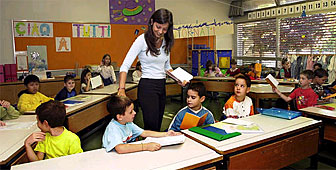Education combats prejudice, UN says

Education ministers from more than 180 countries are attending a United Nations conference in Geneva this week, to learn how education can overcome prejudice and prevent conflict.
According to the UN, education is one of the most effective tools of conflict prevention.
The topic of the United Nations Educational, Scientific and Cultural Organisation’s (Unesco) 46th International Conference on Education – fits with two controversial topics in Swiss education – language teaching, and equal access to schools for foreigners, including the children of illegal immigrants.
The conference theme is “Education for All for Learning to Live Together.”
Human cost of conflict
Although education is seen as an important tool in breeding tolerance, in many places it has not had this effect. The 20th Century was a period of educational advances, but it was also one in which some 190 million people died in various conflicts.
“This is an important contradiction. The expansion of education was not enough to help us to live together in peace,” says Cecilia Braslawsky, director of the International Bureau of Education, the Unesco office organising the conference.
Braslawski says South Africa is one of several examples of how education has helped to heal the wounds in society.
“There are a lot of good experiences all over the world – but they are far from being universal trends,” she told swissinfo, adding that education can help to overcome not only ethnic, religious or economic divisions, but also those between the generations and the sexes.
Access in Switzerland
One of the criticisms levelled against Switzerland – where there are 26 separate education systems – is that children do not necessarily have the same access to schooling, and that is especially true of the children of immigrants.
In some cantons, foreign children are placed in different classes from Swiss children, while the children of clandestine workers are sometimes denied access to lessons.
“It is dangerous to separate children. It is important for them to encounter differences and to be able to understand each other,” Braslawski says.
The Swiss delegation to the conference is being led by Martine Brunschwig-Graf, education minister in canton Geneva, where, in some schools, as many as 70 per cent of new pupils do not speak French.
Sharing common values
“Every child has to have access to education, regardless of what kind of papers their parents have,” Brunschwig-Graf says.
“All of these children have to learn to live together. They have to learn common values. They have to learn to respect themselves and each other,” she told swissinfo.
Fundamental to bringing down barriers is the learning of languages – especially those of one’s neighbours. One of the most contentious issues in Swiss education at the moment is the teaching of foreign languages – and specifically which foreign language a child should learn first.
A number of German-speaking cantons have announced that they intend to make English the first foreign language taught. Brunschwig-Graf has been one of the most vocal critics of this policy, believing that a national language should be introduced first, in the interests of national cohesion.
Question of culture
“We must not forget our multilingual identity,” she says. “Language is not only a question of communication, it is a question of culture.”
“When we have no values and no culture, we cannot share our identity, or accept the identity of others,” she adds.
A whole range of questions will be addressed at the conference, such as the role played by globalisation, information technology and democracy, and the extent to which these can contribute to the goal of universal, inclusive education.
In some countries, the hope that school might provide a means to overcome the divisions in society is somewhat fanciful, since education for all remains an unfulfilled dream.
Cecilia Braslawski says the conference will address those areas that the educators can improve. But she says it is difficult to put them into practice if the economic and social conditions are not right.
“There is a trend in society to demand that education provide all of the solutions. But it is also the job of society. A child cannot learn if he does not have enough to eat,” Braslawski says.
by Roy Probert

In compliance with the JTI standards
More: SWI swissinfo.ch certified by the Journalism Trust Initiative
You can find an overview of ongoing debates with our journalists here. Please join us!
If you want to start a conversation about a topic raised in this article or want to report factual errors, email us at english@swissinfo.ch.